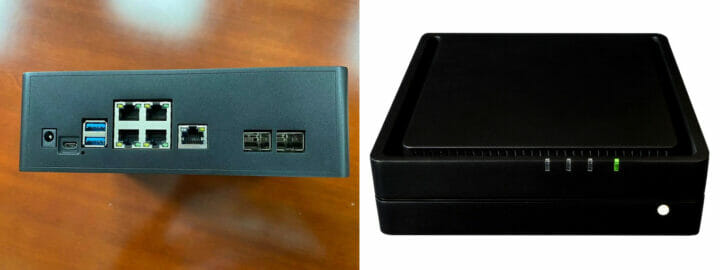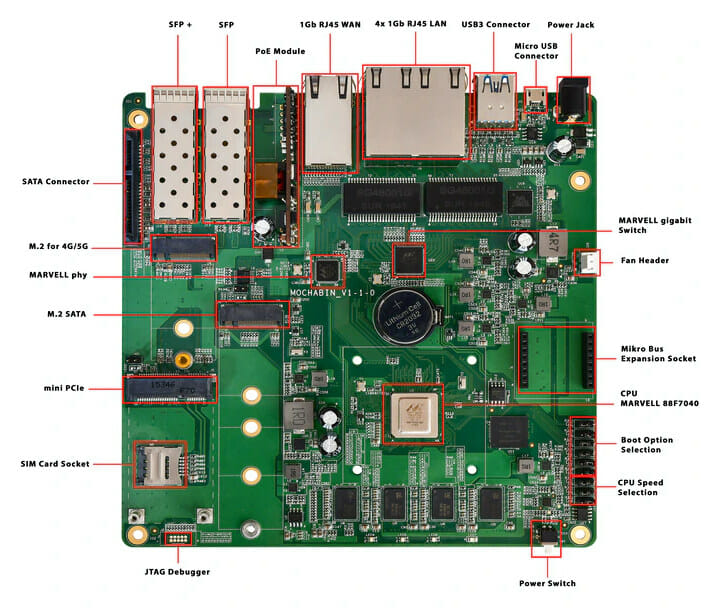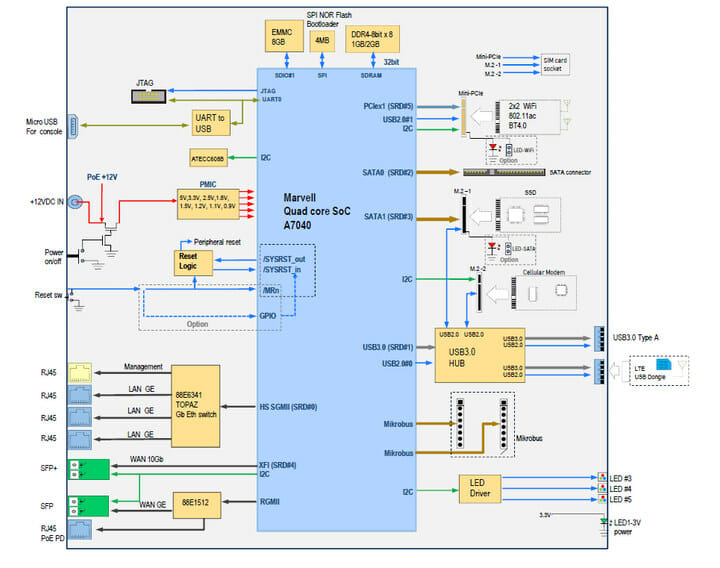Globalscale Technologies has a follow-up to their low-cost ESPRESSOBin SBC based on Marvell Armada 3700LP SoC. The MochaBin-5G SBC is powered by a Marvell Armada 7040 quad-core Cortex-A72 processor, and offers 10GbE networking for as little as $159, with as well as optional WiFi 6 and 5G connectivity.
The single board computer is equipped with 16GB eMMC flash, up to 8GB DDR4, and plenty of high-speed interface with multiple Ethernet ports, USB 3.0 ports, M.2 socket for SATA and Cellular, and a mini PCIe for Wi-Fi and Bluetooth connectivity.
- SoC – Marvell Armada 7040 quad-core Corex-A72 processor @ up to 1.4GHz
- System Memory – 4GB or 8GB DDR4 (soldered down)
- Storage – 16GB eMMC flash, 4MB SPI NOR flash for bootloader, SATA connector, M.2 2280 socket for SATA III SSD
- Networking
- 1x 10GbE SFP+, 1x 1GbE SFP (via 88E1512 PHY)
- 4x Gigabit Ethernet RJ45 LAN ports via Topaz 88E6141 switch
- 1x Gigabit Ethernet RJ45 WAN port (via 88E1512 PHY) with PoE support; Note: multiplexed with 1GbE SFP, so only one can be used at any time
- Optional 4G or 5G cellular connectivity via M.2 2250 socket plus SIM card slot
- Optional NXP 88Q9098 based Mini PCIe wireless card for 802.11ax WiFi 6 and Bluetooth 5
- USB – 2x USB3.0
- Expansion – 16-pin MikroBUS header for GPS, and other expansion and accessories
- HW Security – Microchip ATECC608B secure element
- Debugging – 10-pin JTAG header, micro USB port for serial console
- Misc – Power button, RTC with CR2032 battery holder, 12V fan header, various LEDs, boot and CPU speed selection jumpers
- Power Supply – 12V DC or PoE
- Dimensions – TBD
The MochaBin-5G board ships with either Ubuntu or OpenWrt, with the latter maintained by Sartura who also work on mainlining Linux for the board, and relies on their own Replica One build system to provide the OpenWrt image. Another software partner of Globalscale Technologies is CubbitCell is a distributed NAS company, introduced the Cubbit distributed cloud storage solution on Kickstarter about two years ago. Cubbit will ship in a NAS version of MochaBin-5G board with a 2TB to 6TB NAS grade HDD.
OpenWrt software development progress is visible publicly with a recent commit by Sartura adding Globalscale MOCHAbin to OpenWrt, and which was discussed in a thread in OpenWrt forums.

Globalscale has recently launched the Mochabin-5G SBC on Kickstarter with a lowly $6,500 funding goal that has already been surpassed. There was a $110 super early bird for the 20 pieces of the board only with 4GB, but it did not last long. The cheapest reward is now the $159 “Mochabin Standard early bird” with the board with 4GB RAM, a 12V PSU, a plastic enclosure, and Ubuntu pre-installed. If you prefer having OpenWrt pre-installed, you’d need to pledge $225 for a “MochaBin Firewall” system that also contains the WiFi 6 and Bluetooth 5.0 mini PCIe card. The Cubbit powered “MochaBin NAS” further adds a 2TB NAS, of which 1TB is usable, for a total of $450, while the “MochaBin Ultimate” provides 10GbE, WiFi 6, and 5G connectivity for $549 with Ubuntu preloaded. Some of the wording on Kickstarter is confusing, so there may be some errors in the description. Shipping adds $20 to the US, $30 to the rest of the world, and backers will need to be patient as the MachoBin-5G SBC or router is scheduled to start shipping in May/June 2022.
Thanks to Maurer for the tip.

Jean-Luc started CNX Software in 2010 as a part-time endeavor, before quitting his job as a software engineering manager, and starting to write daily news, and reviews full time later in 2011.
Support CNX Software! Donate via cryptocurrencies, become a Patron on Patreon, or purchase goods on Amazon or Aliexpress. We also use affiliate links in articles to earn commissions if you make a purchase after clicking on those links.







Nice seeing the SFP+ port, but there’s only two SATA ports. And one goes to an M.2 socket. Is this meant to just be a fancy network router?
What’s the point of a single 10Gbps port? A router needs more than one fast port.
Trunking. Router on a stick pattern. Fine use case for that.
Keep in mind these were the guys that shovelled out the ESPRESSOBin and hoped that someone else would deal with the actual support. I still have my 4gb “super ESPRESSOBin” and after all this time it’s still not stable and there is no support for the advertized 1.2ghz (which was a lie, as the chip they shipped was not specced for it)
What wasn’t stable for you? Apart from the ethernet switch messing up my network when rebooting them I had two running for years as my gateway, firewall etc.
The only real issues were that they were slow as hell and whether they would boot again after building a new kernel was a real ache (generic arm issue, not specific to these boards). I replaced them with two odriod h2s.
EspressoBin may randomly reset or lock up. Great for servers.
Mine didn’t… I had them mounted to big aluminium blocks without any fans.
I bought two, one of them doesn’t work properly, it randomly resets. I’ve read about others having similar problems. I could communicate fine with Globalscale until I started having problems, then they stopped answering me. A great way of making sure customers will never return.
Yeah… I ended up feeling guilty when I told some friends to get one. Was gonna make a NAS for a family member with one and then never felt confident enough.
Enjoy the professional Orange Pi experience, you been pie faced 😋
100% agreed, Globalscale Technologies is pretty awful for support. I partially blame Marvell, they need to stop partnering with them on projects like this.
The problems that may have Marvell SOC devices all around is not specific to GlobalScaleTechnologies but is for all the Boards which get theses SOC !
Mainlining hardware is a long time process…
Manufacturer as a short timeline with quick EOS…
This is not true. I work at a telco and we developed a board with Methode Electronics based on the same SoC (Armada 3720), and didn’t have any of the problems the Espressobin did. We hired Sartura (who thankfully Globalscale seems to be working with this time around) to mainline the device, and they mainlined it in Linux, uBoot and OpenWRT within ~6 months.
Not purchasing anything from them ever again.
Once a product is in your hands, there’s no way you can return it or get your money back if it’s faulty. Just avoid them.
I’m saving up for the ClearFog CX LX2 instead!
Well, be *extremely* careful about Clearfog CX LX2. I’ve ordered two Honeycomb LX2 boards on 23 May. They’re still on hold. Yes, 4.5 months ago! And the worst about it is that they will never provide any information if you don’t seriously insist. I can accept any delivery issue, component shortage or whatever, but here they will never tell you anything upfront. You have to ask again and again and again. At some point they’ll tell you “you don’t need to ask us all the time, we’ll let you know when there are news” (except they don’t). After insisting they told me they were missing a connector, I said that maybe it’s one connector that I don’t even need and I could be OK with receiving the board without it. No, definitive refusal with no more indication. And that’s all 🙁 To be honest I think the story about the connector is just a poor excuse and they’re having much bigger problems if they’re doing their best to avoid giving any information. I’m extremely disappointed by their behavior, I’ve had better experience in the past with them. I’m at the point where I don’t believe I’ll see the boards anymore, or I’ll receive them when they’re totally outdated or I don’t need them anymore.
Thus my advice is: contact them before ordering anything important to you, and make sure they *really* have the product in stock and ready to be shipped, otherwise you could have as bad an experience.
In the mean time we’ve seen the AVA platform appearing with much more modern hardware (https://www.ipi.wiki/pages/com-hpc-altra). I already regret having asked SolidRun as that one would better suit my needs. If AVA becomes available before I get my boards, I’ll probably have to cancel the order to switch to it.
Willy, don’t take this wrong, I am not attacking you. But stop being a nice victim, become a very unhappy paid customer !
Demand your money back , did the way you paid have a means to recover the money?
Sell your story to a magazine or journal that serves that industry! If thats not you, fair enough, just Western union wire transfer me, $600 dollars and will send you one! But there maybe a long, long, long wait for a part 😉🤐
I’m not trying to make them bad publicity or anything like this, nor to get the money back until I have any other product to buy in exchange. I’m looking for a platform like this to develop thread-optimized algorithms. I’d prefer the AVA platform but for now it’s not yet on sale. Of course if AVA was already available, you can bet that the order would already be cancelled. But for now my sole hope is that this finally arrives.
However it’s not a reason for not warning others about SolidRun’s totally unacceptable lack of communication and the risk about ordering from them without prior verification: while they know they’ve been unable to fulfill an order over the last 4+ months, they’re still taking orders for the product on their site!
Thanks for letting me know.
I’ll take your advice and ask them in advance.
Welcome to the Orange Pi experience 😆😂
Thankyou, heh. =)
I stopped purchasing from China over a year ago, so I’m a bit happier these days.
-I’ve also set up my two Raspberry Pi 4B to use swap over network (though if you go on SmackOverflow, you’ll see that it’s not possible – I found out that after I did it).
After setting up a swap over NFS, I can compile large sources, which would not build on my 1GB Pi 4B before (I forgot if it was Linux or if it was GCC that failed; it’s been a while).
[yes, and some of the (rare) wrong answers even get higher up-voting from its groupies (better check with alternative information, if own experience is not available or possible)]
But take care with exposing memory content to (public) networks, etc. (?, if security is prime, local swap or compressed ram parts are useful for that, too)
Never thought about using NFS swap, you doing so on mechanical drives?
This used to be pretty common on SunOS when machines had too little local storage. By then memory size was low and usage as well. I’ve used SparcStation2 and SparcIPX with 24MB RAM which were pretty beefy by then. Swapping the whole RAM would take ~22 sec at 10 Mbps though. The RAM-to-network bandwidth ratio seems to have remained roughly the same nowadays.
> The RAM-to-network bandwidth ratio seems to have remained roughly the same nowadays.
But CPU horsepower is magnitudes higher now and zswap exists 🙂
I’m happy with my Orange Pis, HW is still working fine, after years of 24/7 usage. Software, I have to maintain myself, but I didn’t expect otherwise.
This look like an amazing hw for the price. I understand the concerns on support… but the price/specs are insane.
Orange Pi boards so cheap, who needs support !
Solidrun’s Macchiatobin is not much more expensive and has much more interesting specs by using a 8040 that offers twice as many SERDES lanes (i.e. SATA + extra 10GE ports). They’ll also soon have the new clearfog based on CN913x that will offer one 10Ge port in the clearfog tiny enclosure. I’m really interested by this one but I won’t order anything from them anymore before they promise me they really have it in stock.
“Solidrun’s Macchiatobin”
-I second that!
ClearFog GT8K is also a candidate; it has MiniPCIe, which could be used for Marvell based SATA interfaces. One could use the GbE for WAN and 10Gbit for LAN on ‘slow’ networks. Apart from that it might do well when creating a small build-farm (it supports up to 16GB SODIMM).
-But the MacchiatoBin is a pretty valuable board, since it adds PCIe and built-in SATA.
Am I missing something? There is no HDMI or display port mentioned in the specs.
You’re not missing anything. It’s a board for networking & storage applications, so a video output is not needed.
Seems like great value. Unfortunately I promised myself that I will never ever touch anything Marvell branded again willingly.
Marvell does great products. They just take time to be mainlined but they ultimately get really great support. They’re just totally retarded on the docs. They want you to sign NDAs to access 100-page docs that they call “datasheets” that are rarely sufficient to get proper support, which explains why the products start to work several years after being sold. It’s sad, as they have still not understood how documentation can help a whole community to fix issues and stabilize their platforms in much lower time, resulting in a better image and higher market share.
I would definitely not use a recent Marvell chip in our products, it would have no chance to work reliably (limited early mainline support or horribly bogus BSP). However using a properly mainlined one, I’d do without hesitating. These Armada 7k/8k definitely qualify as properly supported ones by now, and are really good SoCs when you need good I/Os.
The problem is not at GlobalScaleTechnologies, the problem is the support of Marvell is a little too much silent on helping community developers !
like for cpufreq: armada-37xx: forbid cpufreq for 1.2 GHz variant issues.
But it is only my feeling, from years of experiment and use of the Marvell SOC, mainly on GlobalScaleTechnologies Boars.
Marvell SOC are too quickly EOS.
I think the 37xx was their worst ever chip. I suspect they almost did not invest any money in it, and just made the silicon at dirt cheap investment by filling unused holes on existing silicon wafers and expected the community to write all the code for it and to debug it. A friend of mine ordered an Espressobin that was supposed to support “up to 1200 MHz”. It never reliably booted beyond 800. Clearly the chips were released too early and customers are part of the testing phase. Due to this I’m staying away from any 37xx chip, as I do not trust them at all. I just don’t know why they continue to sell them, I’ve yet to read about a success report about them! But the serious chips in the 7k/8k range are really great, just like the ArmadaXP were in their time.
Swap the 4 copper ports for 10g versions and upgrade to wifi6e, I’ll buy it then.
in this price range – now way 🙂
I would be a perfect board for the fast 5G device but I think they did make one HUGE mistake if I read the diagram right. The M.2 slot is connected over USB 2.0 only. That does not make any sense as it will max out @ 300-320 Mbps of L2 traffic (480 Mbps USB limit with overhead) WHY it is not connected over USB3.0?
Still no trace of the board 1 year later. It starts to make me think it’s another globalscale scam a-la espressobin. It would help this company’s image if they could eventually release a product that works and try to make everyone forget about the espressobin monster failure.
The devices have just started shipping according to the latest update on Kickstarter (September 30)
Got mine.
Ancient firmware compiled with ancient compilers and panics on shutdown. What I don’t get is that the SheevaPlug and DreamPlug were amazing devices.